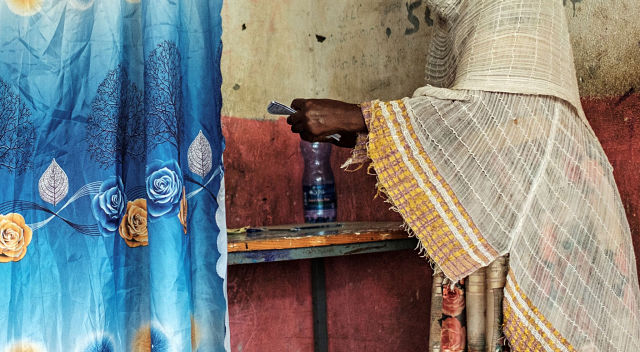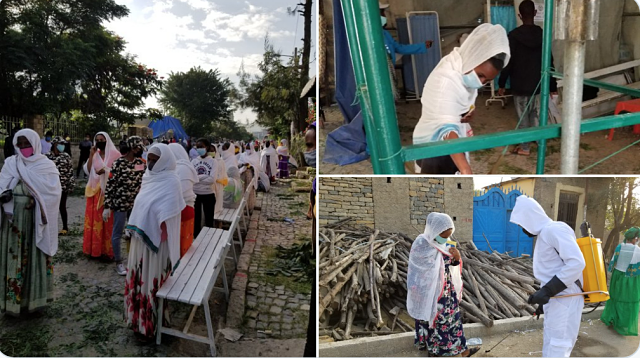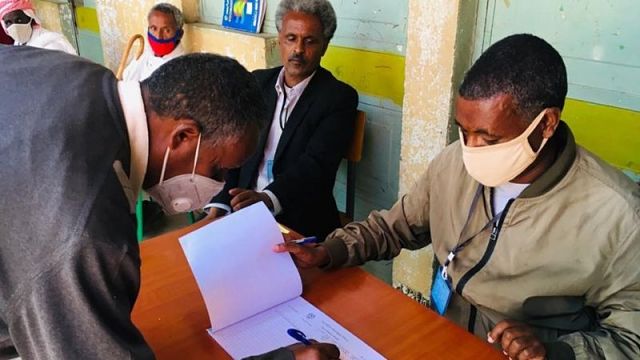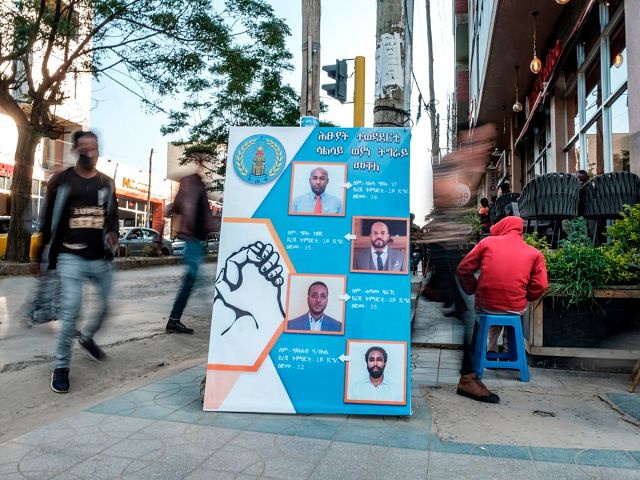 Ethiopia expects to hold general elections within the next year after a vote scheduled for August was postponed because of the coronavirus pandemic, PM says. (Photo: A woman prepares her ballot in a voting booth near Mekele on September 9, 2020. in an election that parliament has deemed illegal/Getty Images)
Ethiopia expects to hold general elections within the next year after a vote scheduled for August was postponed because of the coronavirus pandemic, PM says. (Photo: A woman prepares her ballot in a voting booth near Mekele on September 9, 2020. in an election that parliament has deemed illegal/Getty Images)
By Samuel Gebre and Simon Marks
Updated on September 10, 2020
Ethiopia Expects to Hold Delayed Elections Within Next Year
Ethiopia expects to hold general elections within the next year after a vote scheduled for August was postponed because of the coronavirus pandemic.
“I personally believe there will be elections in the year 2013,” Abiy said on state television on Wednesday. Ethiopia, with its own 13-month calendar that is about seven years behind the Gregorian calendar, celebrates the start of 2013 on Friday.
The ballot will be a test of reforms unleashed by Prime Minister Abiy Ahmed, who has been opening up the country’s once tightly regulated political space since coming to power in April 2018. His unbanning of opposition and rebel groups has stoked political fragmentation and long-suppressed rivalries among ethnic communities.
The 44-year-old premier has also pledged to open up state-owned industries, from telecommunications to energy, to increased foreign investment in one of Africa’s fastest-growing economies.
Abiy announced the new timeline for the election on the day that the nation’s Tigray region held its own parliamentary vote, defying a ban by the federal government.
Ethiopia became one of the first African nations to postpone elections because of the coronavirus pandemic when it delayed the ballot in March. Lawmakers voted to extend the government’s mandate until elections are held, from the previous Oct 10 deadline.
Authorities have had time to learn about the virus, and a vaccine will probably be available to protect people during the election, Abiy said, adding relevant institutions will make a final decision on a schedule.
—
Ethiopian Region Proceeds With Vote Banned by Federal Government

Voters gathered in Mekele on Wednesday for an election that has been declared unconstitutional by parliament, which had postponed the national poll due to the COVID-19 pandemic. (Photo: Twitter/@rcoreyb)
Updated: September 9th, 2020
Ethiopia’s Tigray region began holding an election outlawed by the federal government.
Polls opened at 6:00 a.m. in the northern Ethiopian region, said Abdel Guesh, a spokesman for the Tigray electoral commission. Voting will continue until 6:00 p.m., he said.
The ballot is a direct challenge to Prime Minister Abiy Ahmed’s administration, which postponed general elections earlier this year because of the coronavirus pandemic. It’s the latest in a series of challenges Abiy has faced since he began implementing political reforms two years ago in response to intensifying anti-government protests.
Tensions between the Tigrayan and federal authorities may spawn unrest that could jeopardize Abiy’s plans to open up the economy to foreign investment, according to the International Crisis Group. Some federal officials have said they’ll stop the vote, while the nation’s upper house of parliament on Saturday said the results won’t be recognized, state-controlled Ethiopian Broadcasting Corp. reported.
Depending on how far the dispute goes, it may push the ethnic Tigray group to consider “constitutional secession procedures, further raising the stakes and intensifying conflict risks,” the ICG said last month.
Lost Influence
Tigray’s ruling Tigray People’s Liberation Front was formerly the pre-eminent party in Ethiopia’s ruling coalition, after it helped oust the nation’s Marxist Derg regime in 1991. The party has set itself in opposition to Abiy, an ethnic Oromo, since he came to power in April 2018. In December, it refused to join the Prosperity Party he formed to replace the coalition.
Abiy played down the prospect of the election stoking instability.
“This merry-go-round should not be a headache for us,” he said on state television on Tuesday. “We are not going to lift our hands every time someone shouts asking to affirm their existence.” Security officials on Monday stopped journalists and observers from boarding a flight to Mekele, Tigray’s capital, without providing a reason. The authorities confiscated phones and laptops.
About 3 million people are expected to vote for representatives to Tigray’s 190-member parliament. The results are expected by Sept. 13.
—
Ethiopian Region Votes, Defying Federal Government and PM
By ELIAS MESERET
September 9th, 2020
ADDIS ABABA, Ethiopia (AP) — People began voting in Ethiopia’s northern Tigray region on Wednesday in a local election defying the federal government and increasing political tensions in Africa’s second most populous country.
Tigray officials have warned that an intervention by the federal government would amount to a “declaration of war.” They have objected to the postponement of the national election, once set for August, because of the coronavirus pandemic and the extension of Prime Minister Abiy Ahmed’s time in office.
Over the weekend, Ethiopia’s upper house of parliament called Wednesday’s election unconstitutional. Ethiopia’s leader has ruled out a military intervention, but there are fears any punitive measures by the federal government could further escalate tensions.
The standoff with the northern region is the latest challenge to the administration of Abiy, who won the Nobel Peace Prize last year in part for introducing political reforms. He took office in early 2018. The Tigray region’s ruling party, the Tigray People’s Liberation Front, was the dominant one in Ethiopia’s previous government.
“This election is illegal because only the National Election Board can conduct elections in Ethiopia,” Abiy said in an interview with the state broadcaster, EBC, on Tuesday evening. “TPLF’s rule over the region is extended until the upcoming election. If the party doesn’t take part in the general election, it won’t be acceptable.
“These types of small gatherings won’t be a headache for us,” Abiy added.
Some 2.7 million people in the Tigray region were expected to cast their votes at more than 2,600 polling stations, regional election officials said.
A regional broadcaster, Tigray TV, showed voters lining up in the early hours Wednesday. Two residents of the regional capital, Mekelle, told The Associated Press there was tight security in the city and surrounding areas. Bikes and auto rickshaws were banned from the city as of Tuesday evening.
On Monday, Ethiopian security officials removed reporters from a plane heading to the region, confiscating their I.D.s, cameras and other equipment. Separately, a non-governmental organization told the AP they were barred from observing the election “for no sufficient reason.”
The group, Seb Hidri, said the Tigray People’s Liberation Front was behind the ban.
–
Ethiopian Lawmakers Call Region’s Vote Unconstitutional (AP)

Regional officials in Tigray have opposed the year-long postponement of Ethiopia’s general election, once planned for August, and the continuation of Prime Minister Abiy Ahmed’s mandate beyond term limits. They have organized their own election for Sept. 9. The federal government has said the postponement relates to the COVID-19 pandemic and should be respected. (Getty Images)
By ELIAS MESERET
September 5, 2020
JOHANNESBURG (AP) — Ethiopia’s upper house of parliament on Saturday called elections planned next week in the northern Tigray region unconstitutional, amid a confrontation between the federal government and regional officials who have warned that any intervention amounts to a “declaration of war.”
“The decision by the House of Federation treats the act of the Tigray regional state as void from the very beginning,” legal expert Kiya Tsegaye told The Associated Press. “This makes the election unconstitutional and illegitimate. I think this decision will be the base for the next legal action by the federal government.”
Regional officials in Tigray have opposed the year-long postponement of Ethiopia’s general election, once planned for August, and the continuation of Prime Minister Abiy Ahmed’s mandate beyond term limits. They have organized their own election for Sept. 9. The federal government has said the postponement relates to the COVID-19 pandemic and should be respected.
Members of the upper house of parliament from the Tigray region boycotted its meeting Saturday.
The Sept. 9 vote will elect members of the regional parliament, which in turn will elect the region’s cabinet and administrators.
Ethiopia’s prime minister has ruled out a military intervention to deal with the confrontation, but there are fears that any punitive measures by the federal government could escalate tensions further.
The standoff with Ethiopia’s northern region is just the latest challenge to the administration of Abiy, who was awarded the Nobel Peace Prize last year in part for the sweeping political reforms since he took office in early 2018.
The loosening of the former government’s repressive measures, however, have opened the way for certain long-held grievances and requests by some regions for more autonomy. The former government was largely led by people from the Tigray region, exacerbating the tensions.
—
Join the conversation on Twitter and Facebook.


























